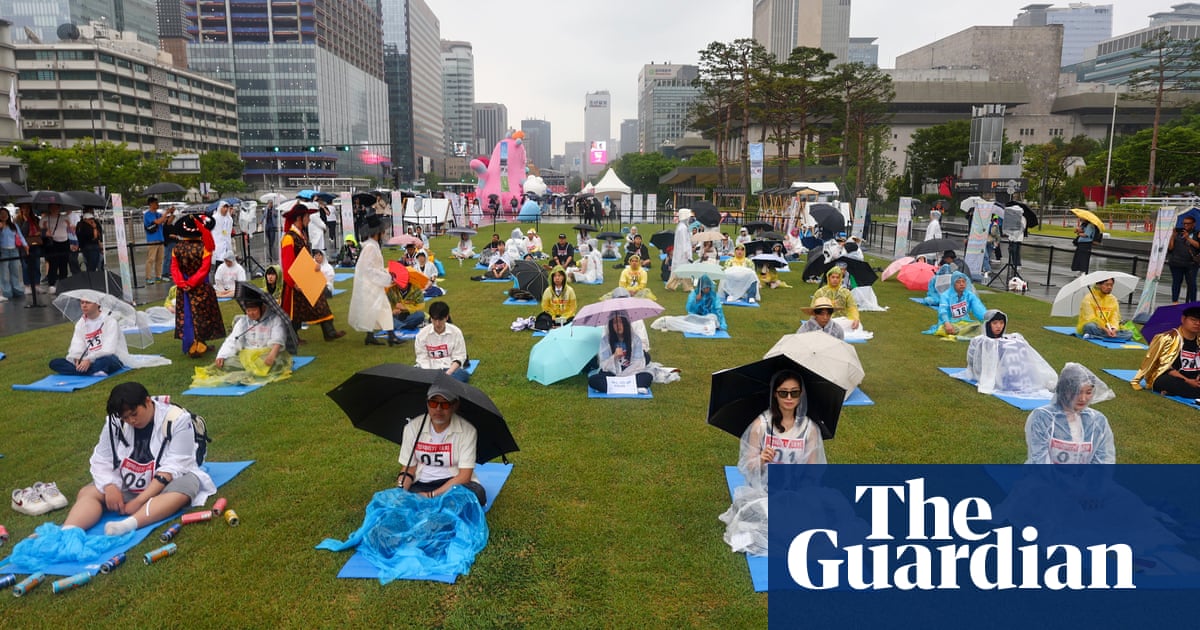World
Much ado about nothing: world’s most relaxed people gather in Seoul for ‘space-out’ competition

In downtown Seoul, in front of the iconic Gyeongbokgung palace, dozens of people of all ages sit on wet yoga mats, staring into space. Some are dressed in doctors’ and dentists’ uniforms, while others wear the attire of office workers and students. Welcome to the international “space-out competition”.
The rules are simple: do absolutely nothing. Falling asleep, however, leads to disqualification. Organisers monitor the participants’ heart rates; the contestant with the most stable heart rate wins.
Started in 2014 by local artist Woopsyang, the space-out competition has grown in popularity over the years. Described as visual art, the performance aims to create a mini-city of people doing nothing amid those busy at work, driving home the message that doing nothing is not a waste of time.
South Korea is known for its punishing work culture, with some of the longest hours in the developed world. Despite the introduction of the 52-hour weekly work limit in 2018, overwork and exhaustion are still not uncommon. In 2023, the government proposed to increase the maximum weekly working time to 69 hours, sparking a severe backlash and eventual backdown.
Students too face high levels of stress, living with the so-called “education fever”, characterised by long hours of study and the attending of private academies in the hope of attending a prestigious university and getting a job at one of the country’s top companies.
A 2022 government survey targeting 19-34-year-olds found that one in three young people had experienced burnout in the past year, with reasons cited including career anxiety at 37.6%, work overload at 21.1%, scepticism about work at 14.0%, and work-life imbalance at 12.4%.
Against this backdrop, Sunday’s event was a chance to take a break from it all. The competition has previously been held in cities such as Tokyo, Taipei, Beijing, and Rotterdam. Participants this year came from home and abroad, including France, Nepal, South Africa, Vietnam, and Malaysia.
The rain did little to deter the participants, most of whom used umbrellas and disposable ponchos. Some lay flat on the ground, gazing at the sky, while others assumed meditative positions. Several wore traditional Korean attire, including a ‘gat’ hat, a symbol of high society during the pre-industrial era, when leisure time was often associated with the nobility and literati.
“In a way, this makes conditions ideal to space out,” the host remarked.
First-place winner Valentina Vilches, originally from Chile but residing in South Korea and working as a psychology consultant, said she came to have fun but also wanted to share her experience with her patients.
“I want to remind them about the importance of spacing out and relaxing and how this positively affects your mental health,” she said after receiving her golden trophy in a shape inspired by Rodin’s The Thinker and the Pensive Bodhisattva, a South Korean national treasure.
Kim Ki-kyung, a South Korean office worker who was nearly late to the event after being made to work on Sunday morning, said it was a small opportunity to take a breather.
“Korean society is very competitive, so sometimes doing nothing is essential,” he said.
“I think we’ve forgotten how to do that.”










